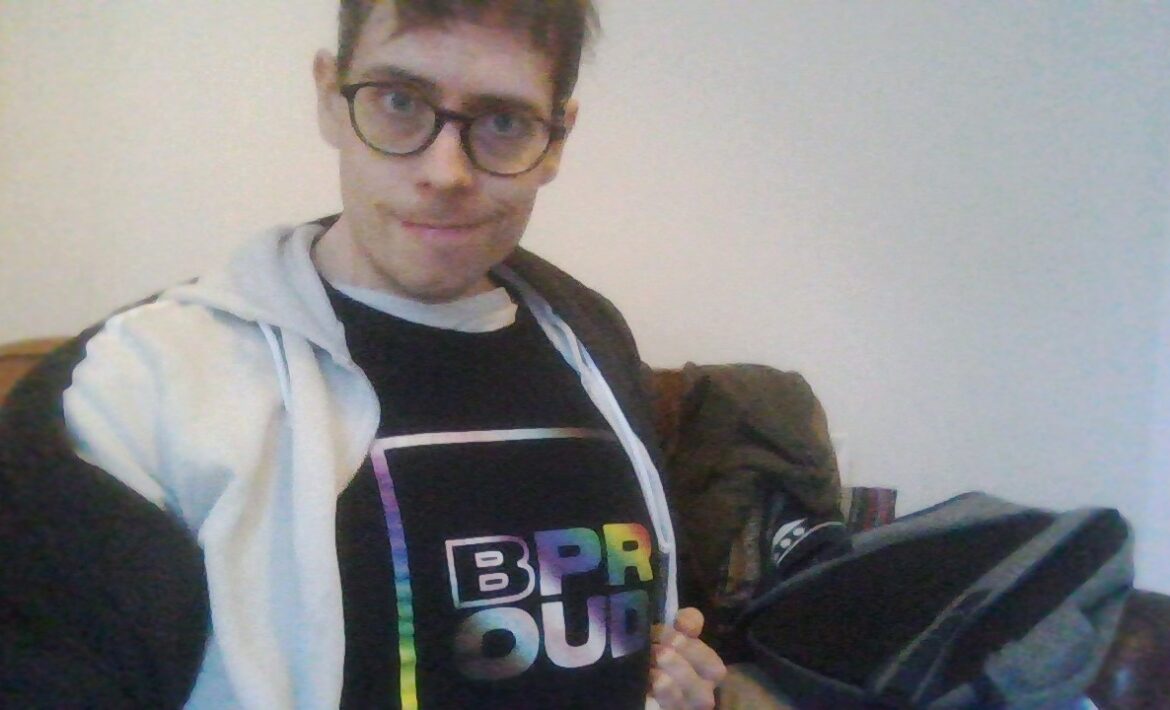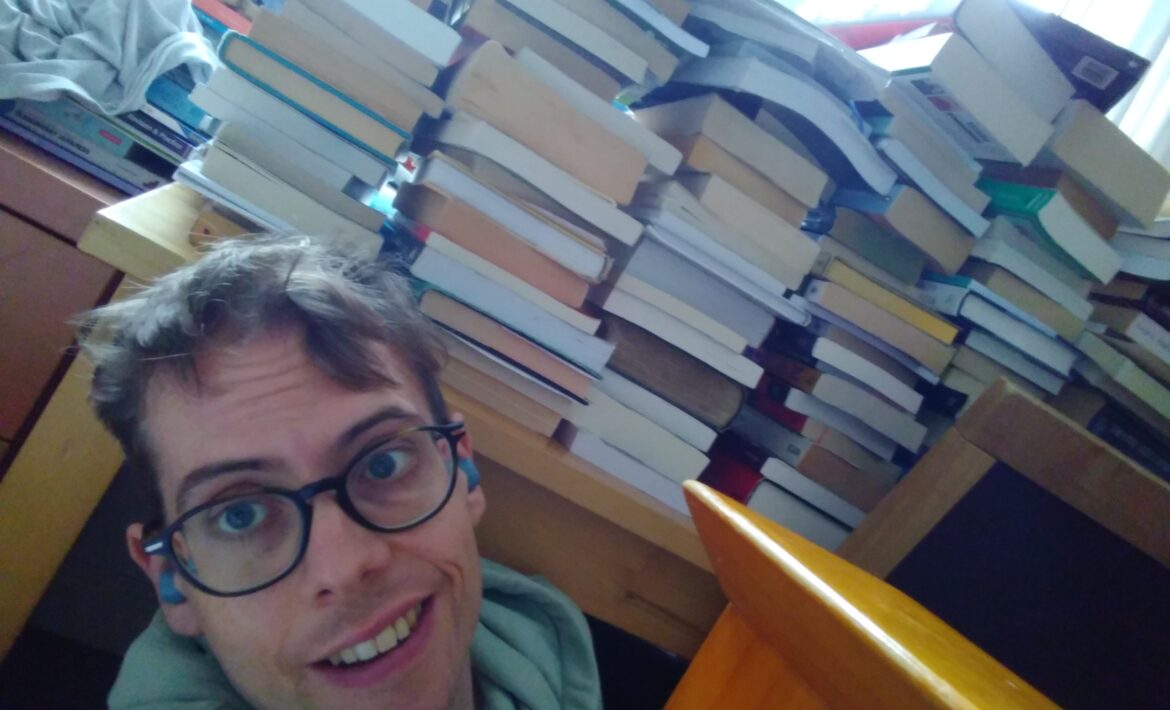
Monday 7th November 2022: Autistic and… In Therapy?
Hello everybody,
Yup, this blog was supposed to be published in September. Then in October, twice. It wasn’t.
I was exhausted last weekend, the week before also, after doing a speaking event and the week before was also bit of a mess. For the first one this November, I’m going to go for one a little shorter than usual. This one is about therapy. It was inspired by this video by video-essayist Jacob Geller.
I stand by my note under the video: it is brilliant and nothing that he says in it is wrong, from my perspective. I do think, though, that a more neurodiversity-informed viewpoint will be helpful.
Diagnosis?
When autistic folk express that we’re not feeling well mentally, the first block in front of us is the well-meaning neurotypical. They will say: “Oh, gosh, of course you’re feeling depressed! The news is atrocious.” It is atrocious. We are very much affected by the outside world. Fuck, I had a huge meltdown about the 2016 EU referendum the day after the results. I was a total mess.
Climate change isn’t helping here:
Yes. We live in a world where fascism is on the rise, the economy is collapsing yet again, and people are genuinely having to scrabble around to pay for fuel in the 6th richest country in the world. We, as disabled people, are shut off from the workplace. It’s not that we’re not capable of working, the economy shuts us out because of who we are. Rather than having to toil away for a pittance, we don’t even get a share of that. The benefits system actively punishes benefits claimants.
“Which is it?” I ask when speaking for HR departments of charities, institutions and companies. “Do you want us to work or not? You don’t want us on benefits, well, then provide work! But then you don’t. We either get stuck in low-paying jobs that don’t provide enough hours and/or get fired from those very positions. OR we don’t get any work at all. Are you surprised autistic suicide rates are so high? These are choices that we make as a society. The syncretisation of Human Resources since about 1980 is very much to blame for that. We are choosing to exclude about 3% of people, just because of who we are.”
When you’re autistic, facing up to the task of living independently is a brutal one. The system is weighed against us at every turn. No wonder we need help.
“New” Autistics
Many people who get diagnosed after childhood do so because they expect something to be put in place to support them. That seems fair: we are less likely to be in work, our lives are more expensive, so financial support would be appropriate. I applied to PIP once, back in 2017. I was told that if I was able to wash myself, I couldn’t expect to get a dime. I didn’t apply in the end. I resigned myself to not getting financial support from PIP.
That’s the norm. The UK has some of the best disability legislation in the world. But the application is nowhere near acceptable.
When you’re getting diagnosed, you won’t know that. All you know is, if you’re lucky, the legal side, which says that you’re owed financial and practical support post-diagnosis. Most just focus on the (seriously stressful) diagnostic pathway.
In fact, once, my partner was on the way to Wales to see friends. On the train, he overheard some Welsh teenage boys bragging to each other about a plan they’d hatched. They were going to go to their local college, pretend to be autistic and: “We’ll get paid for autism!” My partner practically wet himself laughing.
If you’re a Welsh teenager and you’re looking to play the system, let me help you out. There is no pay for autism. Nothing. People are given diagnoses and left to figure things out for themselves.
Any support or, in England, is a postcode lottery. By that I mean it depends on what different localities have available. Some NHS trusts provide a few sessions of post-diagnostic support. Most don’t do anything. Worse, many diagnostic centres, especially on the NHS, are actually encouraged to reject people for diagnosis. Not because they aren’t autistic (even though that is what the patients are told) but as a money-saving exercise.
Diagnosing people is expensive, especially for autism. Whereas BPD or even Bipolar diagnoses can be made by a GP during a single phone call; for autism, a specialist is required. Funny that, because there are no medicinal interventions for autism (ADHD is slightly more complicated, but I’ll leave that for another blog).
I know Wales has a better organised and centralised NHS, but things aren’t that much better there than they are in England. They’ve been dealing with the same ideological budget cuts for decades.
Therapy
One thing that came out a lot from discussions I’ve had with autistic people, pre and post-diagnosis is the hope of receiving some kind of therapeutic support. That is not there. Worse, it’s likely that many autistic people have lost out on mental health support, for no other reason than that they’re autistic. Some children even get support from child and adolescent mental health support, until a diagnosis is provided, and that support is promptly withdrawn.
This is on the one hand understandable. Current therapeutic methods are not built for the benefit of autistic people. Instead, we are expected to fit a neurotypical mould. We don’t. I’ve written before about my own experience trying to find therapy to help with CPTSD, depression and anxiety. There is nothing there. It’s a case of finding people on the open market who are not going to put in place systems that are actually harmful.
This is not because these professionals are unkind or unfeeling, though the latter concept can at least be partly explained through the double empathy problem (drink now, for mentions of the double empathy problem in my blogs). They either have no training on autistic people at all, or they have the wrong training altogether. Both outcomes can (and often will) result in greater damage. If I’m going to have a therapist again at some point, then I would need that person to be autistic and not be a trained behaviourist.
Back to the video
So, behaviourism. It’s bad, m’kay? I have already written plenty about the problematic aspects of behaviourist tendencies within psychology over the past two-and-a-bit years, so you can find it in other blogs if you’re interested in reading up on the topic.
The main selling point, as Geller says in his video, is that behaviourism is testable. It works, if by you mean works is forcing people to respond in an expected manner, for the duration of the test. CBT in particular holds within it a vast underappreciation of human complexity. It doesn’t care about people’s pasts, it only cares about you jumping through certain hoops in an appropriate way. These apps only highlight that. Now, all that people with mental health need can reasonably expect from the NHS is CBT, for 6 sessions (often after waiting times of up to two years) and nothing else, we can say that that is a choice.
Geller states that the initial idea of CBT was to be a temporary sticking plaster, to deal with things in the moment, so the patient becomes ready to deal with issues that go further back. Well, no. That’s not the world we live in. Moreover, since CBT already doesn’t work for NT people with mental health needs, it somehow works even worse for us. Despite the cultural depictions of our community, we are not robots. We are complex, sensitive and more rather than less likely to develop trauma through a combination of societal pressures and a greater likelihood of facing abuse and violence, because of who we are.
If CBT doesn’t work, then medication might help. Well, medication has not been tested on autistic brains up until now. I’m on the board of the very first double-blind medication trial for autistic people, sertraline in this case. It’s 2022. That is in itself offensive. For the entirety of history until this point, we’ve had to trust that our bodies are similar enough to neurotypicals’ and just take the plunge with any prescription we’re given. Our differences are in our neurological systems. We don’t know why we respond differently to certain medicinal interventions than neurotypicals. Quite a few of us haven’t lived to tell the tale.
So, yeah, a huge risk. And, once again, medication in and of itself doesn’t “fix” mental illness. Often all it does is slow us down, meltdowns and shutdowns still present, as are anxiety and depression. We are then frequently left to the private sector, which is neither affordable nor reliable.
Instead there is a profit-driven incentive to make therapy more and more streamlined. Like HR over the past few decades, therapy needs to be effective, cheap and incentive-driven. That selects out people whose brains do not match the very specific expectations of the designer of these therapies. We need something better. We need actually autistic counsellors, actually autistic therapists and actually autistic psychiatrists, with lived experience and a dislike of conversion therapy methods. Before that, we cannot make do with a system that doesn’t even work for neurotypicals.
On Radicalisation (again)
Then there are the potential negative outcomes of us, as autistic people, lacking support for our mental health. Today, I want to I want to turn to a specific potential outcome of lacking mental health support for autistic people: the political radicalisation of autistic boys and men. This last video, by First As Tragedy, an autistic youtuber, is about what can happen if autistic cishet (presenting) white males’ mental distress isn’t heard.
Now, I want to be very clear here: at NO POINT do I support Incel ideology. It is wrong, and vicious and cruel and is a pro-hierarchical anti-left position that should not exist. I do believe that when autistic white cishet boys radicalise, that they are suffering. The most frightening thing about dealing with this intersecting prejudice is accepting that their suffering is not misplaced. It is real. They are not ‘saved’ by gender, race and sexuality – they are valued less.
Moreover, the autistic boys who commit violence and acts of unspeakable terror are not the problem. It is the men who lead them there. The empathy gap between autistic perpetrators and neurotypical organisers, even if that organisation is ad hoc and the person is known to have “acted alone” (such as was the case with the Virginia Tech shooter, who was motivated by radical Christianity as well as by Islamophobia), is enough for anyone who contributed to the negative discourse or have had reactionary conversations with them personally, to gleefully wash their hands of responsibility.
Again, I am not blaming the victims here. I am blaming the men who post fascist content on message boards, who upload videos about hating women and all people of colour, the disabled, queers. I blame the (for lack of a better term) right-wing “intelligentsia” where academics, authors and media figures slap one another on the back as they demean minorities. A far smaller but still significant level of blame should go to some on the left for not being intersectional enough and excluding autistic people unknowingly or because: “the vibe was off.” Of course the vibe is going to be off! It’s the double empathy problem in action.
Yes, it is society. We do undervalue neurodivergent people on a structural level. Hopefully, some of this blog has been helpful in showing that.
In America, it’s become habitual to blame mass shootings on “mental health,” while at the same time removing mental health provision and cutting medical aid. Remember when we were all in a state about Columbine? There have been 40 Columbine’s this year and it’s not even over. That’s a choice.
I have never seen a breakdown of radicalisation based on neurotype when the perpetrator was an Islamist right-winger, simply, because their main crime, in the eyes of Western justice system, was being brown in the first place.
If we understand these things about the radicalisation of autistic men, we can hopefully address their mental health needs more adequately, within a system where autistic mental health will also be taken more seriously.
I will be using part of Feeling Fast and Slow to talk about how our divergent empathy is used against us, as well as why we are unable to access the support spaces we need on an equal level.
Now, to be 1000% clear, I’m not saying “this is what you get when you don’t give autistic people healthcare!!!” – as if that takes away all responsibility from perpetrators. But I am saying there is a context in which these things occur, and they will continue occurring until there is change from the ground up. No-one should face the kind of social exclusion that comes with being neurodivergent. Instead, we should remake society from a baseline of total inclusivity.
Conclusion
So? What should we do? We need so much to change. Let’s begin by pushing as hard as we can to change the current system whilst pushing even harder for a genuine change. There are opportunities, but not if we’re stuck in a paradigm that never worked for us. As I said to a friend the other day, we need tiny acts of revolutionary gay terror, also called Mutual Aid. We cannot do this alone, but we can be there for one another.
Lots of love, wrap up warm, if you’re in the Northern hemisphere.
xxx
Jorik


